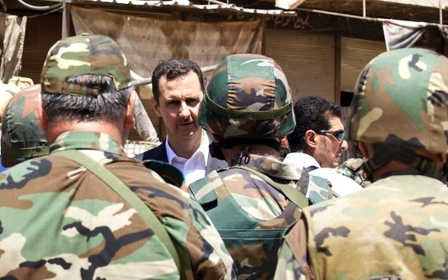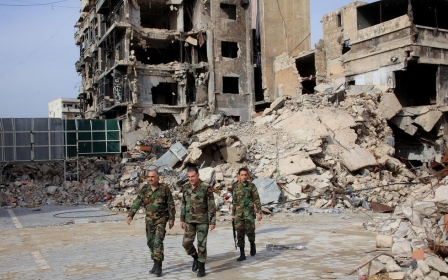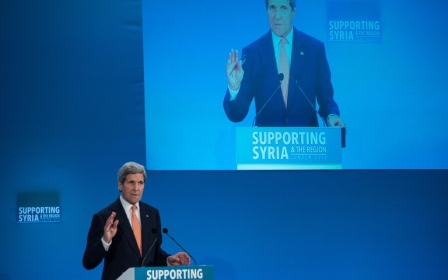Leaders agree to 'full cessation of hostilities' in Syria within 1 week: Kerry

US Secretary of State John Kerry said on Thursday that world powers had agreed to implement a "full cessation of hostilities" in Syria starting in one week.
The 17 countries meeting in Munich agreed "to implement a nationwide cessation of hostilities to begin in a target of one week's time," Kerry said.
It is expected that aid will be allowed to enter at least some besieged areas within the next few days before the guns officially fall quiet. However, the ceasefire will not apply to al-Qaeda's Syrian affiliate, al-Nusra Front, or the Islamic State (IS) group, he said.
"What we need to see in the next few days are actions on the ground, in the field," Kerry said, adding that "without a political transition, it is not possible to achieve peace."
He added that leaders had committed to accelerating and expanding humanitarian aid in the country, and that peace talks should resume in Geneva as "soon as possible".
The US had been pressing Russia for an immediate end to its bombing in Syria, diplomatic sources said earlier, as the country's top diplomats met before wider "moment of truth" talks on the five-year war.
AFP reported that Kerry was pushing for an "immediate ceasefire" from Russian Foreign Minister Sergei Lavrov, hours after Lavrov announced he had presented a "specific" proposal and was awaiting a US response.
Lavrov's comments came hours before the International Syria Support Group (ISSG) of 17 countries including Russia, Saudi Arabia, Iran and the US, met in Munich to discuss the war.
The Reuters news agency said that the US wanted an "all or nothing" result from the Munich talks.
Earlier, Western officials told Reuters that Russia had proposed a ceasefire beginning on 1 March, although this was not confirmed by Moscow.
Heavy fighting had marred the Geneva peace talks in late January, prompting a delay in negotiations.
The UN human rights chief Zeid Raad al-Hussein warned on Thursday that about 51,000 civilians had fled since the joint Russian-Syrian offensive in northern Syria, which began last week.
He described the worsening situation around Aleppo as "grotesque" and has warned that up to 300,000 people are at risk of being besieged.
"The warring parties in Syria are constantly sinking to new depths, without apparently caring in the slightest about the death and destruction they are wreaking across the country," Hussein said, adding that peace talks must resume as soon as possible.
More than 30,000 Syrian refugees have been left stranded on the Turkish border with Turkey saying it is struggling to cope with growing numbers of refugees and warning that tens of thousands more could head north if fighting continues.
Hours before the surprise ceasefire announcement late on Thursday, Turkey threatened to “open the gates” and let millions of refugees on its soil into the EU.
“How much have you [the EU] supported Turkey that has spent some $10bn on refugees?” he asked, saying their $455mn in assistance was “shameful”.
Anti-IS coalition
Meanwhile, US Defence Secretary Ashton Carter said on Thursday that NATO was "exploring the possibility" of joining the fight against the IS group, meaning the alliance and Russian forces could both be fighting in Syria.
Discussions were "very successful and productive," Carter said, noting that the vast majority of the 27 nations he met with had either committed more assets or promised to ask their parliaments to do so.
His comments came after a meeting of defence officials in Brussels.
Carter did not expand on what role NATO would perform in Syria and Iraq, but the US has already requested aerial reconnaissance assistance from the alliance. All NATO members are already partaking in the current US-led coalition in some way, but it is believed that NATO would be able to provide additional expertise and resources.
American 'Plan B'
In case the deadlock is not broken and the latest agreement not enacted, Washington threatened an unspecified "Plan B", according to AFP.
The Russian prime minister meanwhile warned of a risk of "world war" if Arab nations were to enter the conflict in Syria, and had urged talks on a ceasefire.
Dmitry Medvedev told the German newspaper Handelsblatt: "Ground offensives usually lead to wars becoming permanent.
"The Americans and our Arabic partners must think hard about this: do they want a permanent war?
"Do they really think they would win such a war very quickly? That's impossible, especially in the Arab world. There everyone is fighting against everyone ... everything is far more complicated. It could take years or decades."
"Why is that necessary?" he added, according to a pre-released excerpt from the daily's Friday edition. "All sides must be forced to the negotiating table instead of sparking a new world war."
Analysts say that despite the pending ceasefire announcement, there is little hope of reconciling differences.
"After a murderous war that has lasted nearly half a decade, killed 250,000 people and sent 4.4 million refugees fleeing for safety, it is tempting to cloak the merest hint of progress in euphoric terms," The Telegraph's Robert Tait, wrote in a column published on Friday.
"Yet the tentative accord thrashed out by the International Syria Support Group and announced by John Kerry and Sergei Lavrov in Munich on Thursday seems no more likely to herald peace in our time than an ill-fated previous agreement reached in the same city on the eve of the Second World War."
Syria is a crucial ally and military staging post for Russia and Iran, while a growing number of observers say Moscow has benefited from the chaos created by the war, particularly the refugee crisis in Europe.
"The goal of Russian President Vladimir Putin is to destabilise and weaken the West," Koert Debeuf, a research fellow at the University of Oxford, told the Carnegie Europe think tank.
But they also see little chance of a decisive victory for Assad.
"The idea of a full reconquest ... seems neither credible nor durable. It will simply turn into a terrorist or guerrilla situation," said Camille Grand, of the Foundation for Strategic Research in Paris.
Strained relations
Many have criticised the United States for not doing more to support the rebels.
Washington has been reluctant to involve itself in another war after the quagmires of Afghanistan and Iraq, and has sought to focus more on combatting the IS group than getting involved in the civil war between Syria's government and rebels.
"The US has given up the idea of toppling Assad," said Grand. "Kerry seems willing to accept pretty much anything to resolve the crisis."
The conflict has also strained relations between Turkey and its Western allies.
Turkish President Recep Tayyip Erdogan has slammed Washington's increasingly close alliance with the Kurdish militias in the fight against IS, saying it was turning the region into "a pool of blood".
Stay informed with MEE's newsletters
Sign up to get the latest alerts, insights and analysis, starting with Turkey Unpacked
Middle East Eye delivers independent and unrivalled coverage and analysis of the Middle East, North Africa and beyond. To learn more about republishing this content and the associated fees, please fill out this form. More about MEE can be found here.




